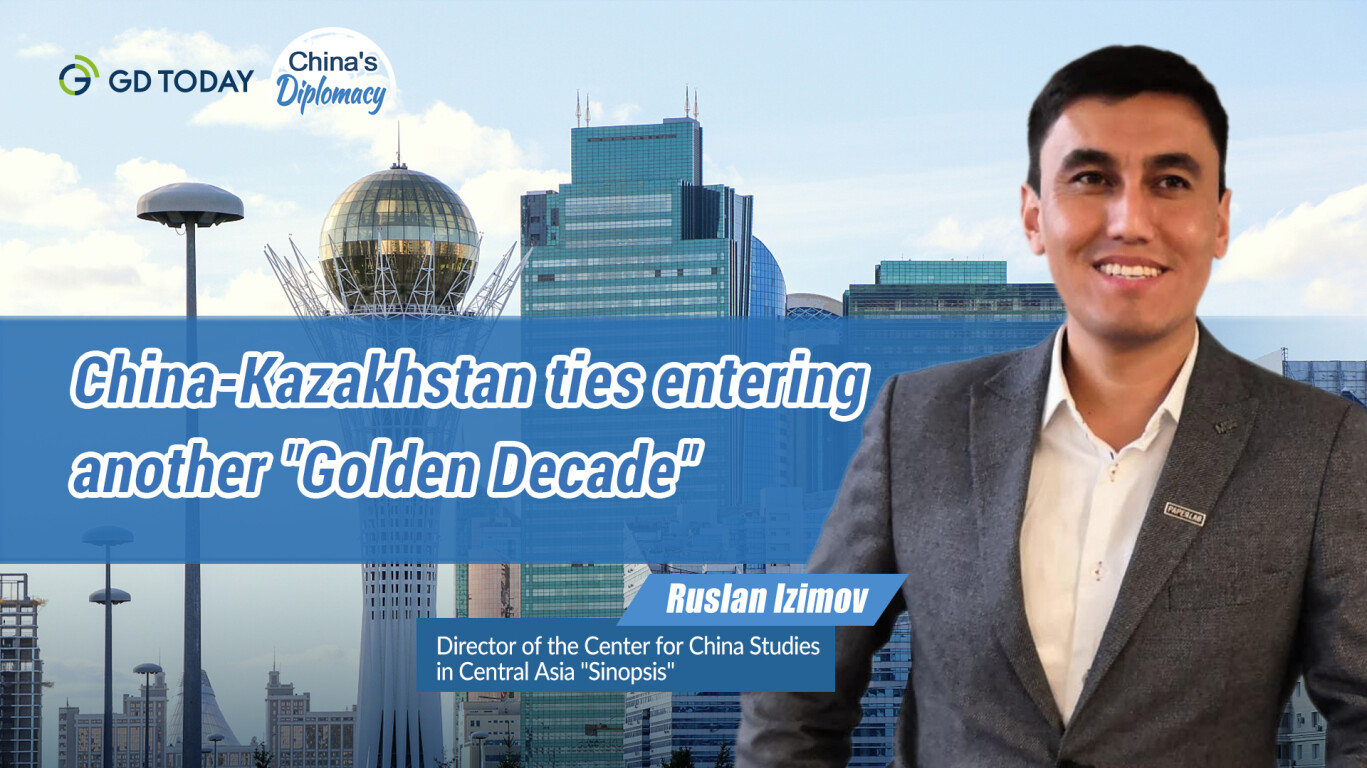
On July 4th, Chinese President Xi Jinping attended the 24th meeting of the Council of Heads of State of the Shanghai Cooperation Organization (SCO) in Astana and set out for state visits to Kazakhstan and Tajikistan, two Central Asian countries that have close diplomatic ties with China.
On July 3rd, Ruslan Izimov, a Kazakh Sinologist and Director of the Center for China Studies in Central Asia "Sinopsis," joined GDToday for an interview and shared his views on China-Kazakhstan relations and the SCO Summit 2024. He believes that through the SCO mechanism, China and Kazakhstan are well-positioned to deepen their understanding and cooperation.
Untapped potentials between China and Kazakhstan
This is President Xi's fifth visit to Kazakhstan since 2013. "The relationship between the two nations is entering a new era," Ruslan said. "Cooperative agreements signed this time were scaled up like never before."
In a signed article published in Kazakh media, President Xi wrote that it was in Kazakhstan eleven years ago that he first proposed the initiative of the Silk Road Economic Belt.
Cases of bilateral cooperation under this framework have brought mutual benefit for the two countries over the years. "Out of all the partnering countries active under the Belt and Road Initiative, Kazakhstan has the largest number of cooperative projects with China," Ruslan specified, "52 joint ventures are being introduced to our country, with more than half already in operation," he said. "It opens up endless possibilities for our economy."
Over the past two years, China and Kazakhstan have reached groundbreaking agreements. "At the end of 2023, the two countries agreed to introduce mutual visa-free policies that facilitate the direct flow of personnel," he said, "The two countries also agreed to open a third checkpoint on the Bakhti railway."
Cultural and educational exchange are also in full swing. Some top Chinese universities have opened branches in Kazakhstan. Ruslan envisions the China-Kazakhstan relationship entering another "Golden Decade" and speaks of untapped potential between the two sides.
In Ruslan's view, there is still untapped potential to tap into, especially in the sectors of agriculture and traffic infrastructure. "Currently, exporters in Central Asian countries are eyeing China as a promising produce market. Traders from Central Asia now only ship their produce to small parts of China," he detailed.
He also said that due to the conflict in Ukraine, the supply chains across the entire Eurasian continent were disrupted. Kazakhstan and other countries in the region, which stand at the heart of the region, suffer from dire consequences. "People in the region hope for an alternative pipeline, and they are committed to becoming a 'bridge' between China and the European Union." He believes this is a chance for partnership with China under the framework of the Belt and Road Initiative.
SCO keeps to its non-aligned nature in honor of mutual trust
As a pivotal event under the SCO framework, the SCO summit addresses key regional issues and opens up dialogue among member states. As a successor to last year's summit in New Delhi, India, the Astana Summit this year placed security and stability high on its agenda.
Over the past 23 years, the "Shanghai Spirit", described as mutual trust, mutual benefit, equality, joint consultations, respect for cultural diversity, and aspiration for collective development, has been upheld among all member states within the SCO framework.
"With this spirit in mind, all border disputes between the three Central Asian countries and China were resolved during the 'Shanghai Five' period," Ruslan mentioned, "and no conflicts were produced." However, many external voices have come and instigated that the SCO should develop into a military alliance like NATO.
On this matter, Ruslan pointed out that it is only legitimate for the SCO to keep its non-aligned nature and honor mutual trust among member states. "We do not want to live under the shadow of the Cold War era. The SCO will never turn into another NATO," he commented.
Multilateralism on the rise: Belarus added as the 10th SCO member state
This year, the Republic of Belarus was officially listed as the 10th member state of the SCO. It started off as the Shanghai Five mechanism back in 2001, with five founding nations: Kazakhstan, China, the Kyrgyz Republic, Russia, Tajikistan, and Uzbekistan.
This family of nations continued to grow in the ensuing years. They constitute 40% of the world's population, and member states created over $23 trillion of global GDP.
With Belarus included as a newcomer, Ruslan Izimov, a Kazakh Sinologist and Director of the Center for China Studies in Central Asia "Sinopsis," emphasized that this year marks a monumental point for the platform. "Belarus's inclusion further commits the SCO to multilateralism and a new type of international order," he said. "We see a growing need for pragmatic cooperation and security to span wider."
Reporter | Jersey
Graphic designer | Lai Meiya
Revisor | Steven, James, Will
















